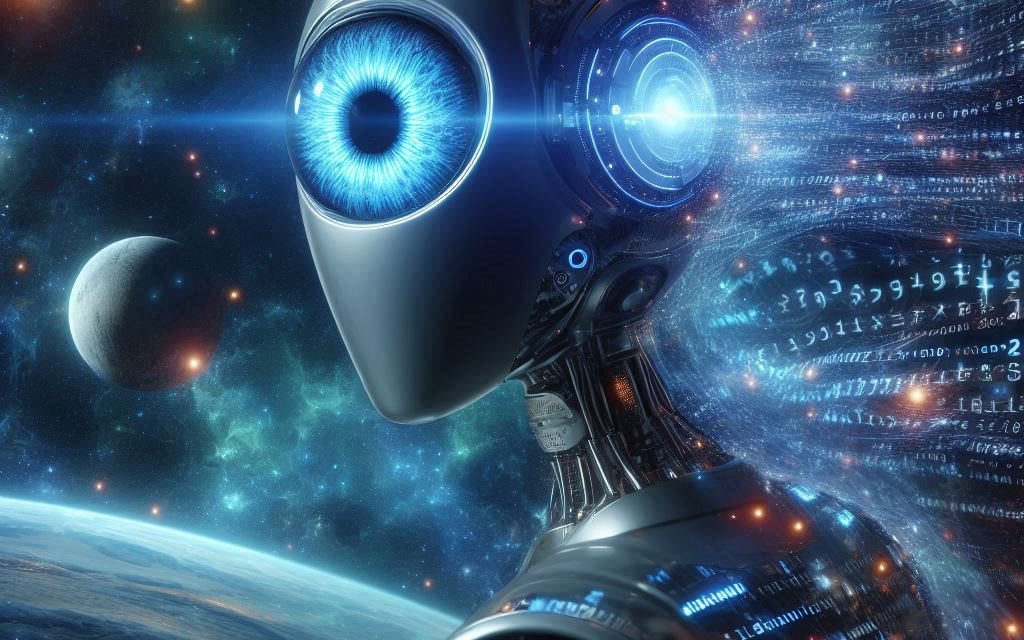galactic ai – Artificial intelligence (AI) is changing the landscape of numerous industries on Earth and now, it’s also trying to stretch its wings out in space. Galactic AI is the game changing merge between state-of-the-art AI technologies and space exploration. This new platform will help us to progress in our knowledge of the universe, improve space missions and discover previously unseen astronomical phenomena. Here, in an exhaustive post we will cover everything about Galactic AI its features, advantages and disadvantages, applications areas, security concerns Impact on astronomy space exploration etc.
What is Galactic AI?
Galactic AI is a sophisticated end-to-end artificial intelligence platform built to improve space exploration and astronomical research in ways we have never seen before. Using machine learning, data analytics and computational modeling, Galactic AI enables scientists, astronomers & space agencies with the most powerful tools to analyze huge corpus of data seamlessly automate complex configuration one-click solutions for understanding the mysteries of universe around us.
Key Features of Galactic AI
1. Advanced Data Analytics
The algorithms used in that competition were also designed for analyzing the enormous datasets produced by telescopes, such as these images of other galaxies. It analyzes complex astronomical data deep down the level of stardust and processes patterns, anomalies or hitherto unseen phenomena using machine learning algorithms. This ability unchains researchers from having to make heads or tails of how much data is being beamed down on them and frees up the bandwidth for deciphering all that new information from space.
2. Automated Image Processing
Image processing is one of the most time-consuming types of astronomy research. Galactic AI eliminates this process through automated image recognition and processing to determine properties of celestial objects on an image or time-delayed basis. This largely speeds up the pace at which astronomical research can be conducted.
3. Predictive Modeling
The company is simulating and predicting cosmic events, using predictive modeling built on top of data from the stars, enabling Galactic AI to forecast behaviors in space. The system can forecast how celestial bodies will move and predict when stars, galaxies or cosmic events like supernovae or asteroid impacts may form by running simplified computational models on historical data. They are essential for planning missions into space and to understand how the universe works.
4. natural language processing (NLP).
It includes basic NLP functions to help researchers communicate and work together. Gravitational AI offers capabilities to analyse and summarise scientific literature, extract important information from research papers, help drafting reports etc. This service drives novel insights into the activities by boosting knowledge mobilization and ensures subsequent information uptake faster.
5. Resource Optimization
Galactic AI for the Space Mission Resource Allocation Based on mission parameters, environmental conditions and technical constraints the platform can suggest optimal paths, schedules and even resource utilisation strategies. This means missions are implemented in an efficient and cost-effective manner that achieves the best possible science return.
Benefits of Galactic AI
1. Accelerated Discoveries
Galactic AI automates data analysis and image processing in astronomy. These allow reserachers to concentrate in results and hypothesis generation while saving time for this instead of having to do manual handling chores.
2. Enhanced Accuracy
AI algorithms allow higher precision in astronomical observations and measurements. By ensuring that data interpretation is consistent and dependable, we have created a system – Galactic AI), which ironically keeps human error & biases to the minimum.
3. Cost Efficiency
This, in turn, lowers the cost of conducting space missions as a result of reducing its complexity through automation and efficient resource allocation. By helping space agencies do more with less Galactic AI can drive sustainability in the new gold rush.
4. Predictive Insights
Predictive modeling plays an important role in forecasting the events that are going to occur with occasional bodies and cosmic phenomena due on some fine points. The capability to have this kind of foresight is key for mission planning as well as managing risk and protecting both space assets and Earth-based infrastructure.
5. Cooperation and Knowledge Transfer
With NLP capabilities, researchers can work together with better access to and understanding of scientific literature. ConclusionIn a sentence, Galactic AI encourages the open knowledge and global research community both collaborating together in humanity to resolve the universe mysteries.
Applications of Galactic AI
1. Astronomical Research
This makes Galactic AI a potent application for astronomers investigating the universe. It assists researchers in examining data collected by telescopes and observatories, to identify new celestial entities, map galaxies and observe cosmic phenomena.
2. Space Missions
Galactic AI can help space agencies effectively plan and execute their missions. The platform improves every part of a space mission from the design and optimization of trajectories to real-time telemetry monitoring, including cross-support data sharing.
3. Planetary Defense
In addition, the predictive modeling capabilities that Galactic AI has are absolutely crucial for planetary defense efforts. It is able to detect potentially dangerous asteroids and comets, monitoring the early warning of their approach in order to define cases for possible collision avoidance strategies.
4. Satellite Operations
Galactic AI provides tools for satellite operators to optimize deployment, monitor performance and predict maintenance needs. Sustainable satellite missions are thereby guaranteed and the provision of communication, navigation as well as Earth observation services is secured.
5. Education and Outreach
Galactic AI to develop educational tools and resources – for schools, universities or general public. By inspiring interest in space science and authorizing the next generation of scientists and explorers with challenging, gorgeous astronomy data available to learners — teachers or students alike.
The Future of Galactic AI
There is so much more potential in Galactic AI, and future advancements will lead to a breakthrough regarding aforementioned space explorations and astronomy. The following are expected to take place:
1. Interstellar Exploration
Galactic AI might be a key link in the chain of interstellar exploration as advances (and breakthroughs) take place with AI technology. While not much is known about many of these, there has been talk in the past about advanced AI systems being able to help navigate and do research within distant star system that could arguably be beyond human accessible ranges.
2. AI-Driven Telescopes
In future, with these AI equipped telescopes there will be no need of manual focus adjustments. The telescope can even prioritize what celestial objects to view just by real-time data analysis and object tracking capability inherent in the system due to this solution. Which would allow for the optimal observation and productivity in astronomical observations.
3. Exoplanet Discovery
Galactic AI will analyze data from space telescopes that are looking for exoplanets, such as the James Webb Space Telescope. The platform will allow the discovery and fine-tuning of significant signals-of-patterns in a candidate exoplanet with an even higher chance that those worlds could be habitable.
4. Cosmic Event Prediction
A more sophisticated predictive model will help Galactic AI to predict cosmic events better. This includes the prediction of how stars live and die, whether/chow black holes are formed and what is dark matter/dark energy doing.
5. Deep Space Missions
In cases of deep space missions, Galactic AI will also offer autonomous decision making so spacecraft are capable to navigate and carry out research without a direct link. It is particularly important for missions tasked with exploring the fringes of our solar system and beyond.
Conclusion
Galactic AI indeed is a highly advanced in the pioneering field of space exploration and astronomy. By incorporating artificial intelligence, the platform equips scientists and space agencies for studying data in novel ways with state-of-the-art tools that both streamline workflow processes and increase understanding about objects beyond our planet. With advanced data analytics, automated image processor ores – AI ng, predictive modelling and resource optimization features – Galactic AI provides a complete solution for deep space discovery.
As AI technology continues to improve, the power of Galactic AI will only rise, and its output could contribute much more in our understanding of Universe. Whether you’re an astronomer looking to discover, a space agency hoping to optimize your missions or a educational institution striving for better tools and insights into the wonders of galaxy AI has something unique in store. Leveraging this revolutionary platform for exploring space will enable us access to new horizons of discovery and understanding Pen13 Like with many other cutting-edge technologies there are hurdles in the development, design, testing; then using these advanced systems requires further engineering again.





